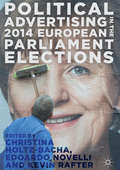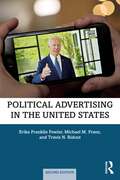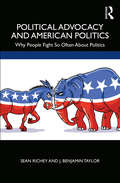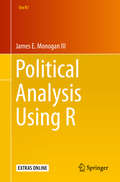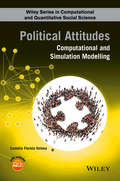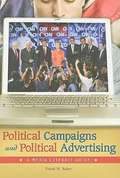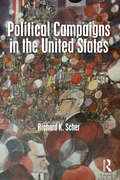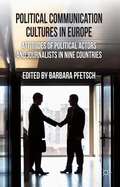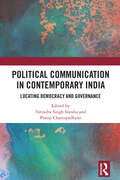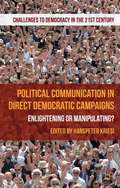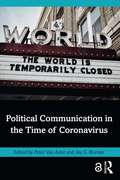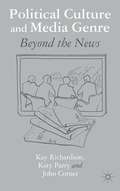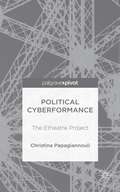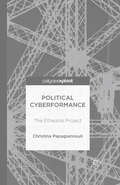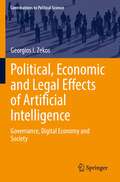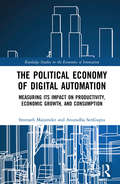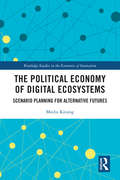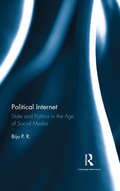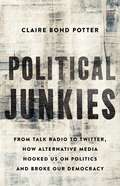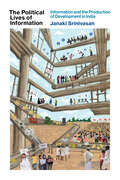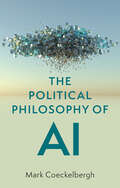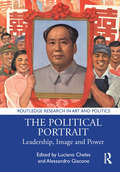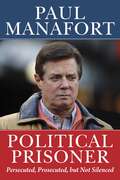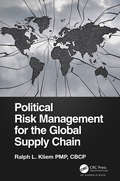- Table View
- List View
Political Advertising in the 2014 European Parliament Elections
by Christina Holtz-Bacha Edoardo Novelli Kevin RafterThis timely publication offers a fresh scholarly assessment of political advertising across the EU, as well as an insight into differing political and regulatory systems related to political advertising in the individual member states. With a detailed focus on the images and communication styles that characterised the 2014 European Parliament election campaign, this edited collection evaluates political advertising across the EU using empirical data to compare and contrast styles and approaches in different members. This work allows the authors to offer an important evaluation of the similarities and differences in the posters and broadcasts used to win public support in the 2014 campaign at the time of the great European recession and financial crisis, specifically looking at the place of posters and video commercials. This book will appeal to researchers and students of political communication, political science, history, European studies as well as candidates and campaign workers who want a more comprehensive understanding of the representation of Europe in political adverts at the 2014 elections.
Political Advertising in the United States
by Michael M. Franz Travis N. Ridout Erika Franklin FowlerPolitical Advertising in the United States examines the volume, distribution, content, and effects of political advertising in congressional and presidential elections. The book considers the role of television ads using extensive data on ad airings on local broadcast stations. It also analyzes newly available data on paid digital ads, including ads on Facebook, Instagram, Google, and YouTube. The book covers the role of outside groups in airing ads, including the rise of dark money groups and gaps in existing federal campaign finance laws around transparency of outside group spending. The authors consider how ad sponsors design and target ads. They also review the positive and negative implications of an electoral system where billions are spent on paid advertising. With detailed analysis of presidential and congressional campaign ads and discussion questions in each chapter, this accessibly written book is a must-read for students, scholars, and practitioners who want to understand the ins and outs of political advertising. New to the Second Edition • Covers the spending, content, and tone of political advertising in the 2016 and 2020 presidential elections and the 2018 midterms, looking ahead to 2022 and 2024. • Addresses the interference of foreign actors in elections and their connection to political advertising. • Expands the discussion of digital political advertising and incorporates this topic into every chapter. • Adds a new chapter specifically addressing digital ad content and spending. • Includes data from the Facebook, Google, and Snapchat ad libraries and explores the role of these companies in regulating the sale of political advertising. • Incorporates new data on the effects of race and gender in advertising, including what is known about the way in which advertising may activate prejudicial attitudes.
Political Advocacy and American Politics: Why People Fight So Often About Politics
by Sean Richey J. Benjamin TaylorPolitical Advocacy and American Politics provides a detailed explanation as to why citizens engage in interpersonal advocacy in the United States. Sean Richey and J. Benjamin Taylor eloquently show how the campaigns, social media, and personality and partisanship affect one's propensity for candidates, which often leads to arguments about politics. Using original qualitative, survey, and experimental studies, Richey and Taylor demonstrate the causes of political advocacy over time in the political environment and at the individual level. While some worry about the incivility in American politics, Richey and Taylor argue political talk, where conflict is common, is caused by high-activity democratic processes and normatively beneficial individual attributes. Furthermore, Richey and Taylor argue that advocacy—when conceptualized as a democratic "release valve"—is exactly the kind of conflict we might expect in a vibrant democracy. Political Advocacy and American Politics: Why People Fight So Often About Politics is ideal for university students and researchers, yet it is also accessible to any reader looking to learn more about the role campaigns and personal attributes play in the decision to advocate.
Political Analysis Using R
by James E. MonoganThis book provides a narrative of how R can be useful in the analysis of public administration, public policy, and political science data specifically, in addition to the social sciences more broadly. It can serve as a textbook and reference manual for students and independent researchers who wish to use R for the first time or broaden their skill set with the program. While the book uses data drawn from political science, public administration, and policy analyses, it is written so that students and researchers in other fields should find it accessible and useful as well. By the end of the first seven chapters, an entry-level user should be well acquainted with how to use R as a traditional econometric software program. The remaining four chapters will begin to introduce the user to advanced techniques that R offers but many other programs do not make available such as how to use contributed libraries or write programs in R. The book details how to perform nearly every task routinely associated with statistical modeling: descriptive statistics, basic inferences, estimating common models, and conducting regression diagnostics. For the intermediate or advanced reader, the book aims to open up the wide array of sophisticated methods options that R makes freely available. It illustrates how user-created libraries can be installed and used in real data analysis, focusing on a handful of libraries that have been particularly prominent in political science. The last two chapters illustrate how the user can conduct linear algebra in R and create simple programs. A key point in these chapters will be that such actions are substantially easier in R than in many other programs, so advanced techniques are more accessible in R, which will appeal to scholars and policy researchers who already conduct extensive data analysis. Additionally, the book should draw the attention of students and teachers of quantitative methods in the political disciplines.
Political Attitudes: Computational and Simulation Modeling
by Camelia F. VoineaPolitical Attitudes: Computational and Simulation Modeling Camelia Florela Voinea, Department of Political Science, International Relations and Security Studies, University of Bucharest, Bucharest, Romania Political Science has traditionally employed empirical research and analytical resources to understand, explain and predict political phenomena. One of the long-standing criticisms against empirical modeling targets the static perspective provided by the model-invariant paradigm. In political science research, this issue has a particular relevance since political phenomena prove sophisticated degrees of context-dependency whose complexity could be hardly captured by traditional approaches. To cope with the complexity challenge, a new modeling paradigm was needed. This book is concerned with this challenge. Moreover, the book aims to reveal the power of computational modeling of political attitudes to reinforce the political methodology in facing two fundamental challenges: political culture modeling and polity modeling. The book argues that an artificial polity model as a powerful research instrument could hardly be effective without the political attitude and, by extension, the political culture computational and simulation modeling theory, experiments and practice. This book: Summarizes the state of the art in computational modeling of political attitudes, with illustrations and examples featured throughout. Explores the different approaches to computational modeling and how the complexity requirements of political science should determine the direction of research and evaluation methods. Addresses the newly emerging discipline of computational political science. Discusses modeling paradigms, agent-based modeling and simulation, and complexity-based modeling. Discusses model classes in the fundamental areas of voting behavior and decision-making, collective action, ideology and partisanship, emergence of social uprisings and civil conflict, international relations, allocation of public resources, polity and institutional function, operation, development and reform, political attitude formation and change in democratic societies. This book is ideal for students who need a conceptual and operational description of the political attitude computational modeling phases, goals and outcomes in order to understand how political attitudes could be computationally modeled and simulated. Researchers, Governmental and international policy experts will also benefit from this book.
Political Campaigns and Political Advertising: A Media Literacy Guide
by Frank W. BakerBaker, a media literacy consultant and author, has written this media literacy guide for general readers who want more critical insight into propaganda and spin, political advertising and the role of new media technologies in election campaigns. The author uses clear and easy-to-understand language to examine and interpret the content of media messages in print, image and multimedia forms in an objective manner. The author supplies both a timeline of the history of media in politics from 1913 to the present and a glossary of political and media terms. Annotation ©2009 Book News, Inc., Portland, OR (booknews.com)
Political Campaigns in the United States
by Richard K. ScherA Choice Highly Recommended Title—January 2017 This book is an interpretive analysis of political campaigns in America: instead of focusing on how campaigns are designed and run, it investigates the role campaigns play in our American politics, and the close symbiosis between campaigns and those politics. The text examines how campaigns are an important manifestation of how we "do" politics in this country. Hallmarks of this text include: showing how campaigns can undermine our democracy and asking how democratic they—and by extension, our politics--really are; demonstrating that the ability of the media to accurately, fairly, and deeply report on campaigns has been severely compromised, both because of the growing "distance" between campaigns and media outlets and because of the structure of "Big Media" corporate ownership and its tight relationship to "Big Money." It asks important questions about the media including: How do the media, reporters in particular, cover campaigns? What pressures and forces shape what and how they present campaigns? What is the impact of the ever-increasing chasm separating campaigns and the media? How does the close tie between corporate mainstream media and Super PAC money affect campaign coverage? How does the ability of campaigns and media to segment voters into ever-smaller slices influence how campaigns are covered? tracking the continuing growth of unregulated, private, unaccountable "dark money" in campaigns as a threat to our democratic elections and politics. Democracy rests fundamentally on transparency and accountability – sunlight – and our campaign laws and norms now allow and encourage exactly the opposite, largely because of decisions by the United States Supreme Court.
Political Communication Cultures in Europe
by Barbara PfetschThis book offers new and compelling insight into the orientations that shape the cultures of political communication in nine Western democracies. It is a truly comparative account of the views of 2500 political elites and media elites between Helsinki and Madrid on their relationship and their exchanges.
Political Communication in Contemporary India: Locating Democracy and Governance
by Yatindra Singh Sisodia Pratip ChattopadhyayThis book explores the forms, patterns, and trends in political communication in India in the twenty-first century. It underlies the influence of context in political messaging laying bare its complex, overlapping, and multidimensional structures. The volume: Examines how political decision-making is shaped by media — through political speeches, community opinion leaders, and formal and informal public conversations. Explores a range of political communication channels— from community radio to social media. Presents an overview of the problems associated with message designing and message dissemination through communication channels in a political setting. Highlights how political communication impacts critical aspects of democracy and governance and goes beyond mere rhetoric. A comprehensive work on the production, diffusion, transmission, and impact of information in a political environment, this book will be of great interest to scholars and researchers of politics, governance, democracy, media and communication studies, journalism, cultural studies, and South Asian studies.
Political Communication in Direct Democratic Campaigns
by Hanspeter KriesiAnalyzes the communication processes in direct democratic campaigns and their effect on the opinion formation of the voters. Based on a detailed analysis of the politicians' strategies, media coverage and the opinion formation of the public in three campaigns, this book argues that the campaigns are more enlightening than manipulating.
Political Communication in Postmodern Democracy
by Kees Brants Katrin VoltmerThis book explores the changing relationship between politics, the media and citizens. Based on comparative evidence from the UK and the Netherlands it provides new insights into the dynamics of political communication in post-modern democracy, which is characterized by uncertainty about the location of politics and an erosion of grand narratives and political ideologies. The contributions of this volume aim to understand these changes as a two-dimensional process: the horizontal dimension encompasses the shifting power balance between politicians and the media. The vertical dimension explores how new forms of citizenship and the pervasiveness of popular culture alongside new communication technologies are challenging the authority of both established journalism and institutionalized politics. What emerges is a complex picture of politicization and de-politicization, elite dominance and the power of vox populi, mediatisation and effective control of political elites over the public agenda.
Political Communication in the Time of Coronavirus
by Peter Van AelstThis book examines how the COVID-19 pandemic impacted the flows of communication between politicians, journalists, and citizens. Distinguished contributors grapple with how the pandemic, as a global unexpected event, disrupted the communication process and changed the relationships between politics, media, and publics, the three central players of political communication. Using different methodologies, they scrutinize changes in government communication, (new) media coverage, and public opinion during this crisis. The book moves beyond the USA and Western Europe to include cases from Eastern Europe, Latin America, and Asia, taking into account how variations in the political context, the media system and personal leadership can influence how the COVID-19 pandemic challenged the political communication process. It is an ideal text for advanced students and scholars of political communication, political science, and media studies.
Political Culture and Media Genre
by Kay Richardson Katy Parry John CornerExploring the forms and meanings of mediated politics beyond the news cycle, this book encompasses genres drawn from television, radio, the press and the internet, assessing their individual and collective contribution to contemporary political culture through textual analysis and thematic review.
Political Cyberformance: The Etheatre Project
by Christina PapagiannouliWritten from a practice-based perspective, this book focuses on the political character of 'cyberformance': the genre of digital performance that uses the Internet as a performance space. The Etheatre Project comprises a series of experimental cyberformances aiming to reconsider the characteristics of theatre in the Internet age.
Political, Economic and Legal Effects of Artificial Intelligence: Governance, Digital Economy and Society (Contributions to Political Science)
by Georgios I. ZekosThis book presents a comprehensive analysis of the alterations and problems caused by new technologies in all fields of politics. It further examines the impact of artificial intelligence (AI) on the nexus between politics, economics, and law. The book raises and answers several important questions: What is the role of AI in politics? Are people prepared for the challenges presented by technical developments? How will Al affect future politics and human society? How can politics and law deal with Al's disruptive technologies? What impact will AI and technology have on law? How can efficient cooperation between human beings and AI be shaped? Can artificial intelligence automate public decision-making?Topics discussed in the book include, but are not limited to digital governance, public administration, digital economy, corruption, democracy and voting, legal singularity, separation of power, constitutional rights, GDPR in politics, AI personhood, digital politics, cyberspace sovereignty, cyberspace transactions, and human rights. This book is a must-read for scholars and students of political science, law, and economics, as well as policy-makers and practitioners, interested in a better understanding of political, legal, and economic aspects and issues of AI.
The Political Economy of Digital Automation: Measuring its Impact on Productivity, Economic Growth, and Consumption (Routledge Studies in the Economics of Innovation)
by Sreenath Majumder Anuradha SenGuptaWith digital automation becoming ubiquitous, the relationship between man and machine is being redefined. This book, through a focus on America, identifies the tension this relationship has produced, and how it has divided America socially, politically, and economically, ultimately breeding two fundamentally incompatible nations within one: the “forgotten America” and “elite America.” This book enables the reader to visualize the changes brought by automation on our producer and buyer identities, and suggests policy changes that global leaders could adopt to deal with the increasing discord. The book is heavily dependent on a few fundamental concepts of both economics and sociology, such as globalization, labor economics, and cultural homogenization. The book is ideally suited to students and academics researching political economics and sociology, with focuses on globalization, unemployment, and the social impacts of technological advances.
The Political Economy of Digital Ecosystems: Scenario Planning for Alternative Futures (Routledge Studies in the Economics of Innovation)
by Meelis KitsingThis book connects political economy perspectives with scenario planning for mapping out future trajectories of digital ecosystems. The focus is purposefully on digital ecosystems as it encompasses economic, political and social contexts on a global, national and local level. The diversity of political economy approaches allows the author to explore alternative meanings of digital ecosystem development, which is particularly useful for envisioning alternative futures. Often visions about the future of digital ecosystems suffer from a lack of imagination and confirmation bias which is favorable to the extrapolation of current trends. A wide range of political economy perspectives applied through positivist theorizing in this book shows different interpretations of developments in digital ecosystems. Scenario planning teams around the world have applied a collective imagination to show how future trajectories can be radically different from the current trends. The book outlines meta-scenarios for alternative futures of the political economy of digital ecosystems by reviewing and synthesizing the work of foresight teams. These meta-scenarios served as insights for developing four scenarios for European digital ecosystems through the workshops with high-level executives and experts. The scenarios identified the nature of EU cooperation and the development of digital infrastructure as key drivers. These four scenarios developed in the workshops are further operationalized in a specific context by exploring the implications for Estonia as well as for Chinese investments in European platforms. This exercise shows how scenarios of digital ecosystems can be used for stress-testing decisions and strategies. Decision-makers, students, scholars and other stakeholders in a wide range of industries ranging from academia to ride-sharing can use the scenarios for reframing different development trajectories and future-proofing their strategies. The scenarios can be further developed and modified for specific purposes and contexts as they are not written in stone.
Political Internet: State and Politics in the Age of Social Media
by Biju P. R.This book investigates the Internet as a site of political contestation in the Indian context. It widens the scope of the public sphere to social media, and explores its role in shaping the resistance and protest movements on the ground. The volume also explores the role of the Internet, a global technology, in framing debates on the idea of the nation state, especially India, as well as diplomacy and international relations. It also discusses the possibility of whether Internet can be used as a tool for social justice and change, particularly by the underprivileged, to go beyond caste, class, gender and other oppressive social structures. A tract for our times, this book will interest scholars and researchers of politics, media studies, popular culture, sociology, international relations as well as the general reader.
Political Junkies: From Talk Radio to Twitter, How Alternative Media Hooked Us on Politics and Broke Our Democracy
by Claire Bond PotterA wide-ranging history of seventy years of change in political media, and how it transformed -- and fractured -- American politicsWith fake news on Facebook, trolls on Twitter, and viral outrage everywhere, it's easy to believe that the internet changed politics entirely. In Political Junkies, historian Claire Bond Potter shows otherwise, revealing the roots of today's dysfunction by situating online politics in a longer history of alternative political media. From independent newsletters in the 1950s to talk radio in the 1970s to cable television in the 1980s, pioneers on the left and right developed alternative media outlets that made politics more popular, and ultimately, more partisan. When campaign operatives took up e-mail, blogging, and social media, they only supercharged these trends. At a time when political engagement has never been greater and trust has never been lower, Political Junkies is essential reading for understanding how we got here.
The Political Lives of Information: Information and the Production of Development in India (The Information Society Series)
by Janaki SrinivasanHow the definition, production, and leveraging of information are shaped by caste, class, and gender, and the implications for development.Information, says Janaki Srinivasan, has fundamentally reshaped development discourse and practice. In this study, she examines the history of the idea of &“information&” and its political implications for poverty alleviation. She presents three cases in India—the circulation of price information in a fish market in Kerala, government information in information kiosks operated by a nonprofit in Puducherry, and a political campaign demanding a right to information in Rajasthan—to explore three uses of information to support goals of social change. Countering claims that information is naturally and universally empowering, Srinivasan shows how the definition, production, and leveraging of information are shaped by caste, class, and gender. Srinivasan draws on archival and ethnographic research to challenge the idea of information as objective and factual. Using the concept of an &“information order,&” she examines how the meaning and value of information reflect the social relations in which it is embedded. She asks why casting information as a tool of development and solution to poverty appeals to actors across the political spectrum. She also shows how the power to label some things information and others not is at least as significant as the capacity to subsequently produce, access, and leverage information. The more faith we place in what information can do, she cautions, the less attention we pay to its political lives and to the role of specific social structures, individual agency, and material form in the defining, production, and use of that information.
The Political Philosophy of AI: An Introduction
by Mark CoeckelberghPolitical issues people care about such as racism, climate change, and democracy take on new urgency and meaning in the light of technological developments such as AI. How can we talk about the politics of AI while moving beyond mere warnings and easy accusations? This is the first accessible introduction to the political challenges related to AI. Using political philosophy as a unique lens through which to explore key debates in the area, the book shows how various political issues are already impacted by emerging AI technologies: from justice and discrimination to democracy and surveillance. Revealing the inherently political nature of technology, it offers a rich conceptual toolbox that can guide efforts to deal with the challenges raised by what turns out to be not only artificial intelligence but also artificial power. This timely and original book will appeal to students and scholars in philosophy of technology and political philosophy, as well as tech developers, innovation leaders, policy makers, and anyone interested in the impact of technology on society.
The Political Portrait: Leadership, Image and Power (Routledge Research in Art and Politics)
by Luciano Cheles Alessandro GiaconeThe leader's portrait, produced in a variety of media (statues, coins, billboards, posters, stamps), is a key instrument of propaganda in totalitarian regimes, but increasingly also dominates political communication in democratic countries as a result of the personalization and spectacularization of campaigning. Written by an international group of contributors, this volume focuses on the last one hundred years, covering a wide range of countries around the globe, and dealing with dictatorial regimes and democratic systems alike. As well as discussing the effigies that are produced by the powers that be for propaganda purposes, it looks at the uses of portraiture by antagonistic groups or movements as forms of resistance, derision, denunciation and demonization. This volume will be of interest to researchers in visual studies, art history, media studies, cultural studies, politics and contemporary history.
Political Prisoner: Persecuted, Prosecuted, but Not Silenced
by Paul ManafortNEW BOOK CLAIMS DONALD TRUMP WILL RUN AND WIN IN 2024!A riveting account of the HOAX that sent a presidential campaign chairman to solitary confinement because he wouldn&’t turn against the President of the United States. The chief weapon deployed by the government-corporate-media Establishment against the Trump presidency was propaganda. Time and again, allegations from anonymous sources were disseminated by a partisan media, promoted by a dishonest Democrat Party leadership, and ultimately debunked when the facts surfaced. But by the time the truth came out, it was too late. There had already been casualties. One of the highest profile casualties was Paul Manafort. Desperate to defeat Donald Trump—or hamper his presidency after he won—Democrats and their Establishment allies colluded with foreign operatives to concoct a completely false narrative about Paul&’s supposed conspiracy with pro-Russian elements in Ukraine to further Vladimir Putin&’s efforts to influence the 2016 presidential election. But it wasn&’t just defamation of Paul&’s character. They took the unprecedented step of enlisting the US intelligence and law enforcement communities in using their power against President Trump and his campaign team. Political Prisoner finally exposes the lies left unchallenged by media who pronounced Paul guilty long before his case ever saw the inside of a courtroom. Not only is it untrue that Victor Yanukovych or any of Paul&’s clients were &“pro-Putin,&” it is the opposite of the truth. Paul&’s work in Ukraine and throughout his career was 100 percent aligned with US interests in the countries he worked in, sometimes even acting as a back channel for the White House itself. Neither was Paul guilty of laundering money, evading taxes, or deliberately deceiving the US government by failing to register as a foreign agent—which he wasn&’t. These were all politically motivated charges manufactured by the Special Counsel&’s team for one reason and one reason only: to get Paul to testify against Donald Trump about a conspiracy that never existed. When they hear the basis of these spurious charges, Americans will wonder what country they are living in and what has happened to our system of justice. Political Prisoner tells the real story of Paul&’s life and career, exploding the lies about his work in Ukraine, his previous work with foreign governments and business interests in other countries, his involvement with the Trump campaign, and the &“process crimes&” for which he was wrongly convicted and sent to prison. It is no exaggeration to say that everything most Americans think they know about Paul Manafort is false.
Political Risk Management for the Global Supply Chain
by Ralph L. KliemThe global business environment has never been so complex, making supply chains more fragile than ever. A stable business environment seems like a distant dream in today's global marketplace; instability, not stability, has become the norm. Anti-globalization and nationalization, coupled with populist movements and transnational terrorism, just to name a few targeting global supply chains, now pose significant challenges and risks when doing business across the globe. To address such issues, Political Risk Management for the Global Supply Chain: Provides an overview of basic political terminology and political risk management Presents the basic processes of political risk management Examines the current and future impacts of political events on global supply chains By putting aside the passions that politics can raise, the book aims to objectively look at political risk management. Topics covered include: Identifying different categories of political risk Understanding the relationship of political risk management, enterprise risk management, supply chain, project management, change management, and business continuity Laying the groundwork for efficient and effective political risk management Evaluating the effectiveness of responses The book begins with an overview on why political risk management is an important yet overlooked topic and the corresponding consequences if it is ignored or overlookedby enterprises and their global supply chains. Next, it provides systemic and systematic perspectives on political risk management and explains why the topic is more important than ever. Most important, it provides a framework that enterprises, regardless of nationality, can use to develop and deploy to manage political risks. The book concludes by discussing the full spectrum of developing, deploying, testing, and maintaining processes to conduct political risk management.
